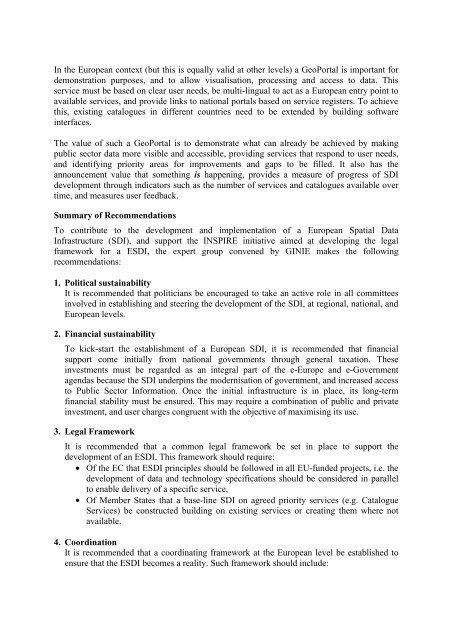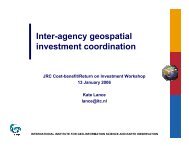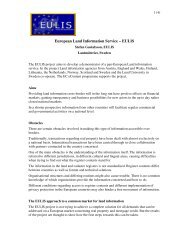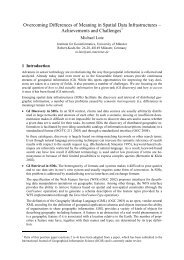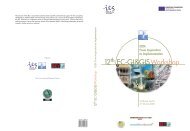Comparative Analysis of NSDI - EC GI & GIS Portal
Comparative Analysis of NSDI - EC GI & GIS Portal
Comparative Analysis of NSDI - EC GI & GIS Portal
You also want an ePaper? Increase the reach of your titles
YUMPU automatically turns print PDFs into web optimized ePapers that Google loves.
In the European context (but this is equally valid at other levels) a Geo<strong>Portal</strong> is important for<br />
demonstration purposes, and to allow visualisation, processing and access to data. This<br />
service must be based on clear user needs, be multi-lingual to act as a European entry point to<br />
available services, and provide links to national portals based on service registers. To achieve<br />
this, existing catalogues in different countries need to be extended by building s<strong>of</strong>tware<br />
interfaces.<br />
The value <strong>of</strong> such a Geo<strong>Portal</strong> is to demonstrate what can already be achieved by making<br />
public sector data more visible and accessible, providing services that respond to user needs,<br />
and identifying priority areas for improvements and gaps to be filled. It also has the<br />
announcement value that something is happening, provides a measure <strong>of</strong> progress <strong>of</strong> SDI<br />
development through indicators such as the number <strong>of</strong> services and catalogues available over<br />
time, and measures user feedback.<br />
Summary <strong>of</strong> Recommendations<br />
To contribute to the development and implementation <strong>of</strong> a European Spatial Data<br />
Infrastructure (SDI), and support the INSPIRE initiative aimed at developing the legal<br />
framework for a ESDI, the expert group convened by <strong>GI</strong>NIE makes the following<br />
recommendations:<br />
1. Political sustainability<br />
It is recommended that politicians be encouraged to take an active role in all committees<br />
involved in establishing and steering the development <strong>of</strong> the SDI, at regional, national, and<br />
European levels.<br />
2. Financial sustainability<br />
To kick-start the establishment <strong>of</strong> a European SDI, it is recommended that financial<br />
support come initially from national governments through general taxation. These<br />
investments must be regarded as an integral part <strong>of</strong> the e-Europe and e-Government<br />
agendas because the SDI underpins the modernisation <strong>of</strong> government, and increased access<br />
to Public Sector Information. Once the initial infrastructure is in place, its long-term<br />
financial stability must be ensured. This may require a combination <strong>of</strong> public and private<br />
investment, and user charges congruent with the objective <strong>of</strong> maximising its use.<br />
3. Legal Framework<br />
It is recommended that a common legal framework be set in place to support the<br />
development <strong>of</strong> an ESDI. This framework should require:<br />
• Of the <strong>EC</strong> that ESDI principles should be followed in all EU-funded projects, i.e. the<br />
development <strong>of</strong> data and technology specifications should be considered in parallel<br />
to enable delivery <strong>of</strong> a specific service,<br />
• Of Member States that a base-line SDI on agreed priority services (e.g. Catalogue<br />
Services) be constructed building on existing services or creating them where not<br />
available.<br />
4. Coordination<br />
It is recommended that a coordinating framework at the European level be established to<br />
ensure that the ESDI becomes a reality. Such framework should include:


